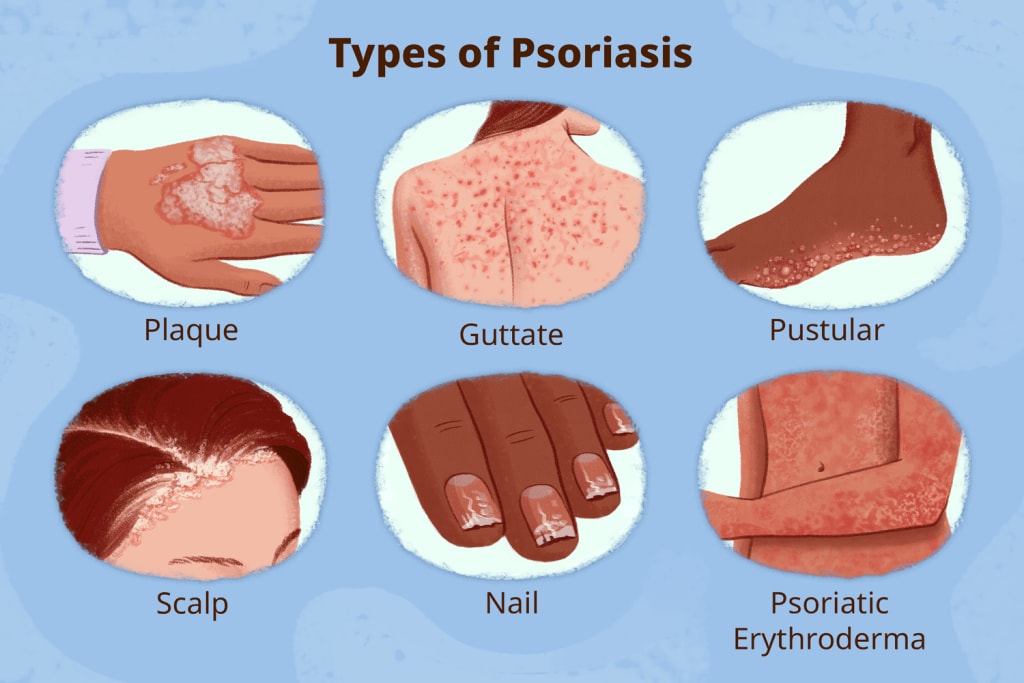Psoriasis
Natural Remedies VS Chemical Drugs

Explain Psoriasis
Psoriasis is a chronic autoimmune condition that affects the skin. It is characterized by the rapid buildup of skin cells, leading to the formation of thick, silvery scales and red patches on the skin's surface. This excessive cell production is caused by a faulty immune response, where the immune system mistakenly attacks healthy skin cells, triggering an inflammatory response.
The exact cause of psoriasis is not fully understood, but it is believed to involve a combination of genetic and environmental factors. Certain genes have been identified as being associated with an increased risk of developing psoriasis. However, not everyone with these genes will develop the condition, indicating that other triggers are involved.
Common triggers for psoriasis flare-ups include:
Stress: Emotional stress can worsen symptoms or trigger a new outbreak.
Infections: Bacterial or viral infections, such as streptococcal throat infections, can trigger or exacerbate psoriasis.
Injury to the skin: Skin trauma, such as cuts, burns, or excessive scratching, can lead to the development of psoriasis in the affected areas.
Medications: Certain medications, such as lithium, antimalarial drugs, and beta-blockers, have been associated with psoriasis flare-ups.
Climate and weather: Cold, dry weather can worsen symptoms, while warm and humid conditions may provide some relief.
Psoriasis can occur on any part of the body, but it most commonly affects the scalp, elbows, knees, and lower back. The symptoms can vary in severity from mild, with small patches of dry skin, to severe, with large areas of inflamed skin. The most common type of psoriasis is called plaque psoriasis, characterized by raised, red patches covered with silvery-white scales.
In addition to the physical symptoms, psoriasis can have a significant impact on a person's quality of life. It can cause itching, pain, and discomfort, leading to sleep disturbances and emotional distress. Psoriasis is also associated with other health conditions, such as psoriatic arthritis, which affects the joints.
While there is no cure for psoriasis, various treatment options are available to manage the symptoms and reduce flare-ups. These include topical treatments (creams, ointments), phototherapy (exposure to ultraviolet light), systemic medications (taken orally or by injection), and biologic drugs (targeted therapies). The choice of treatment depends on the severity of the condition and the individual's response to different therapies.
It's important for individuals with psoriasis to work closely with a healthcare professional to develop a personalized treatment plan and to monitor the condition regularly. With proper management, most people with psoriasis can lead fulfilling lives and keep their symptoms under control.
How Psoriasis effect a person
Psoriasis can have a significant impact on a person's physical, emotional, and social well-being. Here are some ways in which psoriasis can affect an individual:
Physical discomfort: Psoriasis can cause itching, burning, and pain in the affected areas. The skin may feel tight and may crack or bleed, especially in severe cases. This physical discomfort can disrupt daily activities and negatively affect sleep patterns.
Emotional distress: Psoriasis can take a toll on a person's mental and emotional health. The visible appearance of the skin lesions, especially in prominent areas like the face or hands, can lead to self-consciousness, embarrassment, and low self-esteem. Individuals with psoriasis may feel anxious, depressed, or socially isolated due to concerns about their appearance.
Impact on daily activities: Psoriasis can affect a person's ability to engage in daily activities, such as dressing, grooming, and physical exercise. Joint pain and stiffness, associated with psoriatic arthritis, can further limit mobility and hinder activities that require manual dexterity.
Work and social life: The visible nature of psoriasis lesions can lead to difficulties at work or school, affecting productivity and performance. Individuals with psoriasis may experience discrimination, misunderstanding, or stigmatization, leading to social isolation and a reduced quality of life.
Impact on relationships: Psoriasis can strain personal relationships, including romantic partnerships and friendships. The emotional stress and self-consciousness associated with the condition may affect intimacy and communication. Loved ones may also struggle to understand the condition, leading to a lack of support or empathy.
Comorbidities: Psoriasis is associated with other health conditions, such as psoriatic arthritis, cardiovascular disease, diabetes, and depression. These comorbidities can further impact a person's overall health and well-being, requiring additional medical management.
It is essential for individuals with psoriasis to seek support from healthcare professionals, support groups, or mental health services. Managing the condition effectively involves a comprehensive approach that addresses both the physical and emotional aspects. With proper treatment, self-care strategies, and emotional support, individuals with psoriasis can improve their quality of life and better cope with the challenges posed by the condition.
What Remedies can help person with Psoriasis
While there is no cure for psoriasis, there are various remedies and self-care strategies that can help manage the symptoms and improve the quality of life for individuals with psoriasis. Here are some remedies that can be beneficial:
Topical treatments: Over-the-counter and prescription topical treatments can help reduce inflammation, itching, and scaling. These may include corticosteroids, vitamin D analogs, coal tar preparations, salicylic acid, and moisturizers. Applying these creams or ointments directly to the affected areas can help alleviate symptoms.
Moisturization: Keeping the skin well-moisturized is important in managing psoriasis. Regularly applying moisturizers or emollients can help soothe dryness and reduce itching. Look for products that are fragrance-free and specifically formulated for sensitive or psoriatic skin.
Phototherapy (light therapy): Controlled exposure to ultraviolet (UV) light can be effective in treating psoriasis. Phototherapy involves regular sessions under medical supervision, either using natural sunlight or artificial light sources. It can help slow down the excessive skin cell growth and reduce inflammation.
Systemic medications: For moderate to severe cases of psoriasis, systemic medications may be prescribed. These medications are taken orally or by injection and work throughout the body to suppress the immune system or target specific immune responses associated with psoriasis. Examples include methotrexate, cyclosporine, acitretin, and apremilast.
Biologic drugs: Biologic drugs are a newer class of medications that target specific proteins in the immune system involved in psoriasis. They are administered by injection or intravenous infusion and are generally prescribed for severe psoriasis or when other treatments have not been effective. Examples include adalimumab, etanercept, infliximab, ustekinumab, and secukinumab.
Stress management: Stress can exacerbate psoriasis symptoms, so it's important to manage stress levels. Engaging in relaxation techniques, such as deep breathing exercises, meditation, yoga, or engaging in hobbies and activities that promote relaxation, can help reduce stress and improve overall well-being.
Healthy lifestyle choices: Maintaining a healthy lifestyle can have a positive impact on psoriasis. This includes regular exercise, a balanced diet rich in fruits, vegetables, and whole grains, avoiding smoking and excessive alcohol consumption, and getting adequate sleep.
It's crucial for individuals with psoriasis to work closely with a healthcare professional to develop a personalized treatment plan that suits their specific needs. Treatment effectiveness can vary from person to person, so it may take time to find the most suitable approach. Regularly monitoring the condition and seeking medical advice when needed is essential for effective management of psoriasis.
Natural Remedies VS Chemical Drugs for Psoriasis
When it comes to managing psoriasis, both natural remedies and chemical drugs can play a role. The choice between them depends on the individual's preference, the severity of the condition, and the recommendations of healthcare professionals. Let's explore the characteristics of natural remedies and chemical drugs for psoriasis:
Natural Remedies:
Moisturizers and emollients: Natural moisturizers like coconut oil, shea butter, or aloe vera can help soothe dryness and reduce itching. They provide hydration to the skin, which can alleviate symptoms.
Oatmeal baths: Adding colloidal oatmeal to a bath can help relieve itching and inflammation associated with psoriasis. Oatmeal has soothing properties and forms a protective barrier on the skin.
Natural oils: Certain oils, such as tea tree oil, olive oil, or fish oil (rich in omega-3 fatty acids), may have anti-inflammatory properties and can be applied topically or taken orally to potentially reduce psoriasis symptoms.
Sunlight exposure: Controlled exposure to natural sunlight can be beneficial for some people with psoriasis. Sunlight contains ultraviolet (UV) rays, which can help slow down skin cell turnover and reduce inflammation. However, caution should be exercised to avoid sunburn and long-term damage.
Chemical Drugs:
Topical corticosteroids: These medications are commonly prescribed for psoriasis and can effectively reduce inflammation and itching. They come in different strengths and should be used under medical supervision due to potential side effects with long-term use.
Vitamin D analogs: Synthetic forms of vitamin D, such as calcipotriene or calcitriol, can be applied topically to help slow down the growth of skin cells and reduce scaling.
Immunosuppressants: Drugs like methotrexate, cyclosporine, and acitretin work by suppressing the immune system to reduce the rapid turnover of skin cells associated with psoriasis. These medications may have potential side effects and require careful monitoring.
Biologic drugs: Biologics are targeted therapies that block specific immune responses involved in psoriasis. They are usually administered by injection or intravenous infusion and can effectively manage moderate to severe psoriasis. Biologics require careful monitoring and can have potential side effects.
It's important to note that while natural remedies may be well-tolerated by some individuals and provide relief, their effectiveness varies, and scientific evidence supporting their use for psoriasis is often limited. Chemical drugs, on the other hand, have been extensively studied and have a stronger evidence base for their effectiveness in managing psoriasis.
It's recommended to consult with a healthcare professional before trying any natural remedies or making changes to your treatment plan. They can provide personalized advice, assess the severity of your psoriasis, and guide you on the most appropriate treatment options for your specific case.
About the Creator
MOHD AQSHA BIN SAUBIN
#Well done better than well said






Comments (1)
Brilliant. Thanks for sharing.